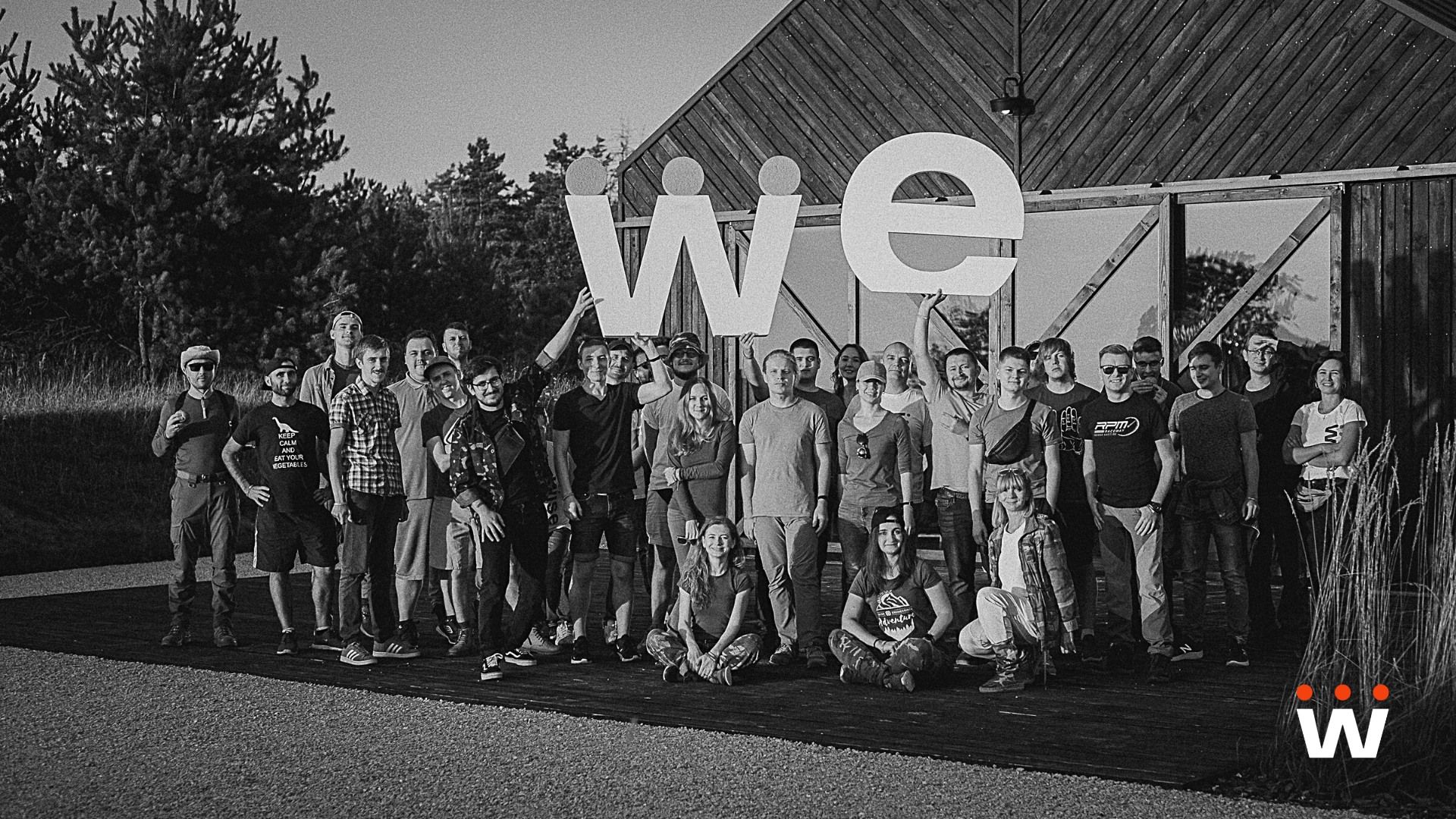Values-driven company: A conversation with Wise Engineering CEO
Corporate values are at the core of Wise Engineering. We sat down with the company’s CEO Max Drogobytskyi to talk about Wise corporate culture and values-driven business. Max has shared what corporate culture means to him, how the company prioritized shared values, explains what values-driven environment is really about, and how values keep company integrated in the long run.
What makes a values-driven business
Q. When you started a company what was your idea of a successful business? What was the most important for you at that step?
M. At that point, the freedom to make decisions myself was what I strove for the most. I didn’t look at other companies and, therefore, never took them as role models. Perhaps, it was my mistake. If I looked, I would, perhaps, make fewer errors and someday would build something similar. Still, I don’t regret anything. I wanted to do everything my way, learned from my mistakes, sometimes I started over. It was a bumpy road, but I am very happy where it got me and Wise Engineering now.
Q. What does a values-driven company mean to you and at what step did you understand that you need to invest in the culture?
M. A values-driven company is a company in which when there is a decision to be made, corporate values are taken into account above any other reasons, including rational or financial.
We say that Wise Engineering is a values-driven company because our shared ethics is behind every decision I make as a leader and every action we take as a team. When faced with any difficult choice or any everyday behavior, we are answering the question – does it correlate with our values?
How did Wise become a values-driven company? At what point? I don’t know. It is who we are and how we operated from day one. I was never a manager that made data-driven decisions. My decisions were made based on my subjective beliefs. Yet, we did not always understand what exactly drove us. At some point, we started to question it and, so to say, turn our values into words across the team.
Q. Can you describe this process a bit further? How was it organized?
M. It was eight years ago, as far as I recall. At that point we hired the company’s first HR manager, and this was her first major task. We wanted to understand what values we had in common and what aspects made up the company’s value system.
We got three random groups that included almost everyone from the company at that point (everyone who wanted to participate in the initiative). We had several iterations where people working in the groups defined values they shared. At first, they described some eloquent situations, behavior models, attitude, wrote everything down. Then they proceeded with grouping and identifying the values behind these patterns. Then the management team worked on the results each group provided. We assembled a list of values we share on the organizational level and included clarifications for each.
So we created a document that is now used across teams and all company departments. The greatest part about company values is that you don’t have to invent them. They already exist. All you need is observe what culture you have, make a decision to shape it, and then act upon it.

Q. What were the easiest and hardest parts in building a values-driven business?
M. Finding the right people is the hardest part. It is much easier to check tech expertise. Several questions and a test task – that’s all you need. With values, the answers are not on the surface. We always include culture fit interviews during the hiring process, still, sometimes you need to let people go after some time working together. Even if it is very important financially to keep this position filled, we never compromise the culture fit aspect.
Besides, it also might be problematic to differentiate between current core values and aspirational ones. Yet, it is something one needs to learn – see clearly where we are now and where are we heading. And not to mix the two.
To me, the easiest part is to live by the values you’ve defined. The answers to disputable questions become obvious. You don’t need to create a policy for every situation that might happen in the workspace, and still the whole team has guidelines that they share. Living by values gives you freedom of being who you are, helps build an open culture that is about honesty and integrity.
Q. Is there any difference between the specifics of building values-driven culture for a product and a service tech company?
M. Sure. There are not only differences but consequences if the values system is not built. What I mean is that every product company has a very unique mission and set of values based on it. It requires work, but still with people united by this unique mission, even when being spread across continents, they feel more aligned by it.
The mission behind service IT companies is very similar, because so are the goals. Thus, when everyone goes remote in the service company, and there is no culture behind, you no longer talk about the team. In this case, the engineer from an outsourcing company is no different from the one working as a freelancer. Yet, if you work with a service company with embodied culture, you can base your collaboration on shared values. The attitude to work here is different, and so are the results you receive on the outcome.
That is why, at Wise Engineering, we pay so much attention to us working together more time in our office, why we hold so many corporate events, and always speak of who we are, and why it is important to preserve.
People behind Wise Engineering culture
Q. The company has evolved so much since 2006, what are you proudest of from all these years?
M. That’s an interesting question. There are many things I’m proud of, but most of all I’d say – people. People behind Wise Engineering I admire the most. And these are both our in-house team and our clients.
I am very proud that we managed to bring together specialists with deep tech expertise that at the same time are united by the values of growth and ownership. Meantime, our clients become our long-term partners that collaborate with us for years. We cope together with world crises and a variety of challenges. The global projects we are part of are impactful, with unique missions that fully correlate with our worldview.
Being surrounded by these people and contributing to global change-driving businesses makes me really proud today. Especially today.

Q. How would you describe a person behind the Wise Engineering culture?
M. Proactive, that’s on top of mind. This person offers and initiates help when that help is needed and gives feedback openly.
This person takes part in company life and takes full responsibility for the things initiated. And this includes multiple non-work related initiatives that we hold at Wise Engineering. We describe this attitude as ownership. To me, this is where the Wise team stands out the most.
Q. What ideas hit on you when the war started?*
On February 24, 2022, russia started a military invasion of Ukraine. When this interview is published, Ukraine is still fighting for its rights as an independent, sovereign state.
M. Honestly, there were no new ideas. This war escalation only strengthened the importance of ideas that we had before. This includes our aim of giving our people the ability to work from abroad and gradually moving towards a product company targeting the global audience. This does not mean we wouldn’t take the outsourcing projects, but we plan to transform our expertise in the SaaS products that would address the complex tech challenges. We want to move in this direction. That’s for sure.
Also, like never before, I felt loyalty from both our employees and our clients. Hard times erase all layers and show who are the people around you. I can’t say enough how valuable it is now to feel the integrity of our team and our partners. Wisers did everything to fulfill our obligations to our clients, we continued hard work no matter what, and some teams had even the productivity rise. At the same time, we received immense support from companies and teams we collaborate with as outsourcing tech partners. We are very grateful for this attitude. Today I feel the results of the culture we’ve built for years.
How to build a values-driven work environment
Q. What would be your imperative for businesses who try to build a values-driven company?
M. You can’t create a value system for yourself and your team. You just need to reflect and name what you already have. Faking culture won’t work. Of course, there can be a list of aspirational values that you aim at, but my idea is to start with what drives you currently.
Explicit values help your company stop operating by rules and policies and start operating by principles. This helps build integrity, open culture, and a strong team that is aligned by shared ethics.
Don’t be afraid to let your values impact what you do next. You won’t regret it in the long run.